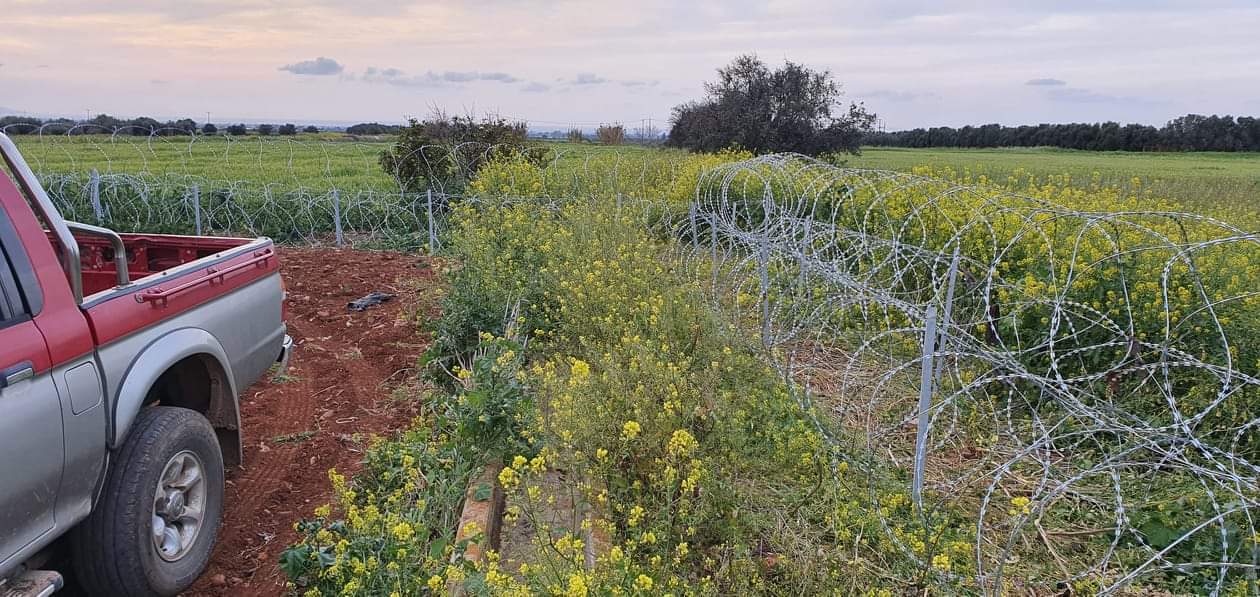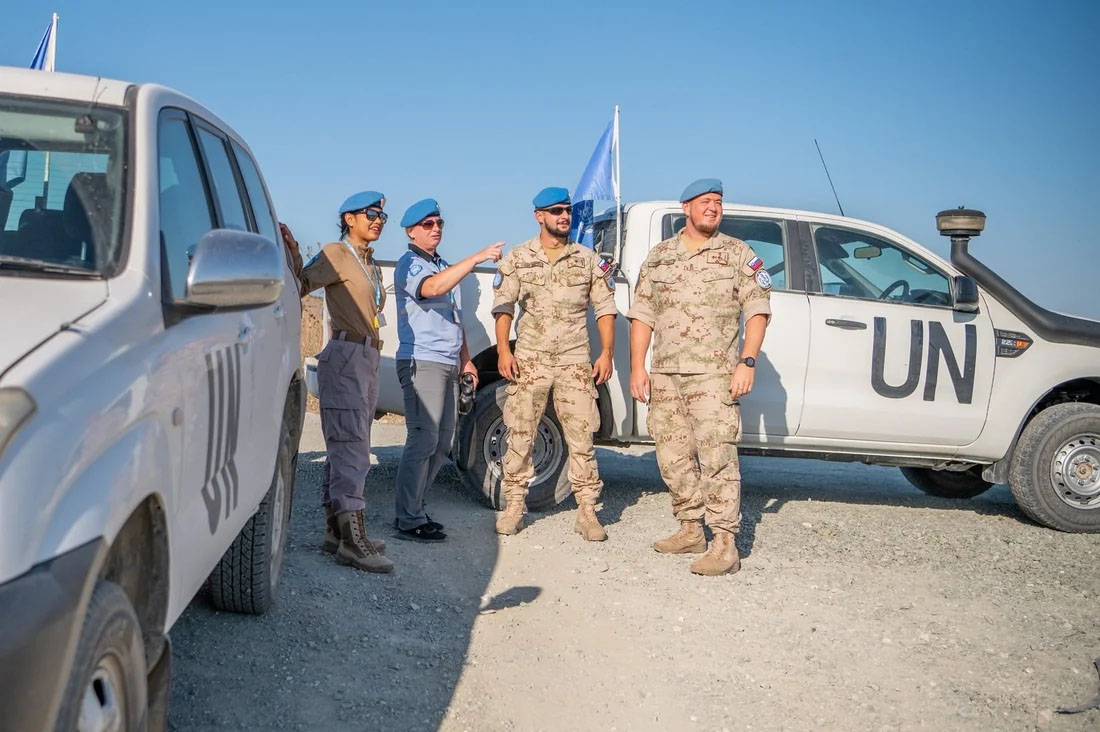In his latest Unficyp report on Cyprus, UN Secretary-General Antonio Guterres on Thursday expressed his strong concerns over the ‘significant’ militarisation of the buffer zone which undermine Unficyp’s peacekeeping efforts.
Guterres highlighted a record number of violations in the buffer zone by both sides, particularly the ‘unabated’ number of sophisticated surveillance cameras
He stressed the importance of avoiding unilateral actions outside the buffer zone that could escalate tensions and undermine the prospects for resuming talks.
“This militarisation is seen as a significant destabilising factor and is in direct conflict with the stated intentions of both sides to move forward with peace talks,” the report said.
These violations include “unauthorised military constructions and the advancement of military capabilities within and near the buffer zone”.
The secretary-general described the actions as reflective of a rapid military buildup, with both the Greek Cypriot National Guard and the Turkish forces seeking to gain a strategic advantage in the buffer zone.
Among the main worries raised by Guterres was the installation of advanced surveillance technology along the southern ceasefire line, which he said “continued unabated”.
“During the period under review, the Republic of Cyprus erected surveillance cameras at 31 additional sites along the buffer zone, six of which are located inside the buffer zone in and around Nicosia, bringing the total of such installations by the Greek Cypriots to 79,” the report said.
“The Republic of Cyprus has explained these violations by claiming that their purpose is to monitor irregular migration. These cameras are mounted on military observation posts,” it continued, adding that the Unficyp considers the installation “particularly destabilising”.
“Turkish Forces installed four additional camera sites during the reporting period, bringing the total of its camera installations along the northern ceasefire line to 110,” the report said, adding that the camera and satellite dish installed by the Turkish forces atop an abandoned house inside the buffer zone known as ‘Maria’s House’ during the previous reporting period remained in place.
“In all instances, Unficyp protested the installations and urged their removal with engagement at both the political and military levels,” the report said, adding that both sides also maintained their prefabricated concrete firing positions in or along the buffer zone.
Guterres’ concerns were released in his draft reports on the United Nations Peacekeeping Force in Cyprus (Unficyp) and his Good Offices mission on the island, covering the period from December 13 to June 24.

He also expressed “deep concern that both parties continue to engage in activities that erode respect for Unficyp’s authority”.
“The frequent incursions by both Greek Cypriot and Turkish Cypriot police into the buffer zone are particularly troubling, as they represent a direct challenge to the mission’s mandate and complicate efforts to maintain peace and security.”
Beyond the buffer zone, Guterres stressed the importance of avoiding unilateral actions that could further escalate tensions or undermine the potential for a return to negotiations.
He reiterated his call for both sides to engage in dialogue to resolve their differences, stressing that only through mutual engagement and trust can progress be made towards a lasting solution.
In his report, Guterres specifically addressed the situation in Varosha, saying that since its partial reopening by Turkish Cypriot authorities in October 2020, “it has remained a contentious issue.”
“The secretary-general underlines that no measures have been taken to address the Security Council’s call for a reversal of the actions taken in Varosha, and he maintains that the United Nations’ position on the issue remains unchanged,” the report said.
“The lack of response to the Security Council’s appeals further highlights the challenges in achieving compliance with international mandates.”
Guterres also reported that access to Varosha for the UN “has remained restricted, resulting in the mission has had limited ability to patrol and monitor developments”.
Furthermore, the report revealed that Unficyp continues to face significant operational challenges, including restrictions on its freedom of movement, highlighting the installation of a 14-kilometre barbed wire fence by the Republic of Cyprus within the buffer zone in 2021 and 2022, “against the protests of the UN mission”.
“This fence has not been removed, despite previous indications that it would be. Such actions not only impede Unficyp’s operations but also signify a disregard for the mission’s efforts to maintain stability and peace.”
In terms of violations, Guterres said Unifcyp had observed 303 military violations, almost equally divided between the Greek Cypriot and Turkish Cypriot forces. These violations included serious breaches that challenge Unficyp’s authority in the buffer zone and along the ceasefire lines.
“The persistence of these violations underscores the ongoing tension and the lack of progress in de-escalating the situation,” he said.
Humanitarian issues also feature prominently in Guterres’ report, as he noted that, due to rising migration and refugee flows, the Republic of Cyprus decided in May to deny asylum procedures to those in the buffer zone.
“This decision has resulted in an increase in the number of migrants and refugees stranded in the buffer zone, requiring urgent humanitarian assistance from Unficyp and the UN High Commissioner for Refugees (UNHCR).”
Despite the tensions, the report also recorded moments of cooperation and humanitarian engagement. In particular, for the first time since November 2019, over 300 pilgrims from the north were allowed to cross into the south to visit the Hala Sultan Tekke mosque in Larnaca, an event facilitated by Unficyp, seen as “a positive step towards fostering intercommunal relations and religious tolerance”.
Moreover, the report highlighted the ongoing efforts to promote bicommunal relations and peacebuilding initiatives.
“Despite the challenging environment, there has been a noticeable increase in the enthusiasm and engagement of civil society in peace efforts,” it said.
“During the reporting period, Unficyp organised and supported 159 bicommunal events, with 23 specifically focusing on women and youth. These events are crucial in building bridges between the communities and fostering a culture of dialogue and understanding.”
Guterres further stressed the importance of bicommunal contacts and called on the leaders of both sides to support and facilitate such interactions, arguing that “the long-standing lack of agreement between the two sides creates further practical and psychological barriers to peace”.
“Thus, both leaders need to take concrete steps towards reconciliation and to ensure that civil society voices are meaningfully included in the political decision-making process.”
The report also touched on the sensitive issue of missing persons.
“The Committee on Missing Persons (CMP) has continued its efforts to obtain additional information on the locations of burial sites from the period of conflict,” it explained. “Both Greek Cypriot and Turkish Cypriot offices of the CMP have been actively engaged in accessing and analysing relevant archives, including aerial photographs and military records. These efforts are part of a broader initiative to provide closure and justice for the families of those who remain missing.”
In concluding his report, Guterres made a strong call for renewed efforts to de-escalate tensions and to return to the negotiating table, stressing that the anniversary of 60 years since the establishment of Unficyp “serves as a stark reminder that the resolution of the Cyprus problem is long overdue”.







Click here to change your cookie preferences